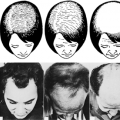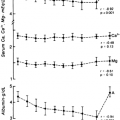GENE AMPLIFICATION BY POLYMERASE CHAIN REACTION
The development of the polymerase chain reaction PCR, a technique for the rapid amplification of specific DNA sequences, constituted a major technological breakthrough.13,14,15 and 16 This procedure relies on the unique properties of a thermally stable DNA polymerase (Taq polymerase) to allow for sequential annealing of small oligonucleotide primers that bracket a DNA sequence of interest; the result is successive synthesis of the DNA strands. Specific DNA sequences as short as 50 and as long as several thousand base pairs can be amplified over a million-fold in just a few hours by using an automated thermal cycler. The technique is so sensitive that DNA (genomic DNA or cDNA reverse-transcribed from RNA) from a single cell can be so amplified. Indeed, a sample containing only a single target DNA molecule can be amplified. The applications of this technique are diverse. Not only is it possible to amplify and to clone rare sequences for detailed studies, but also the technique has applications in the fields of medical diagnosis and forensics. Scarce viruses can be detected in a drop of serum or urine or a single white blood cell. Genotyping can be done from a blood or semen stain, saliva, or a single hair. Paradoxically, a major drawback of PCR is its exquisite sensitivity, which leaves open the possibility of false-positive results because of minute contaminations of the samples being tested. Thus, extreme precautions must be taken to avoid the introduction of contaminants.
Stay updated, free articles. Join our Telegram channel

Full access? Get Clinical Tree





